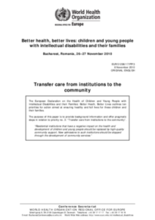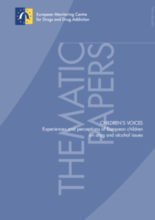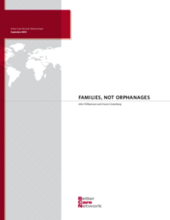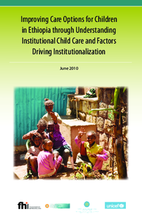Displaying 601 - 610 of 726
The first ever World report on disability, produced jointly by WHO and the World Bank, suggests that more than a billion people in the world today experience disability. This report provides the best available evidence about what works to overcome barriers to health care, rehabilitation, education, employment, and support services, and to create the environments which will enable people with disabilities to flourish. The report ends with a concrete set of recommended actions for governments and their partners.
In this recent opinion-editorial, Ucembe recounts the deeply personal experience of being raised in a Kenyan children’s home and his reflections on the harmful impacts of institutional care on children’s development and psychosocial wellbeing.
The purpose of this paper is to provide background information and offer pragmatic steps in relation to priority no. 3 of the European Declaration on the Health of Children and Young People with Intellectual Disabilities and their Families: “To transfer care from institutions to the community”. The paper was produced in preparation for the conference in Bucharest, Romania 26-27 November, 2010.
The purpose of this paper is to give meaning and insight into some of the key drug and alcohol issues that affect children from the perspectives of the children themselves. Research shows that large numbers of children who are separated from their parents are particularly vulnerable to developing drug and alcohol problems. Special attention is paid throughout the report on children looked after by relatives, foster carers, and institutions.
A fact-finding report on the fleeing of juveniles from the Government Observation Home, Special Home and Children’s Home (Combined) for Boys at Berhampur under Ganjam District of Orissa on 21-22 September 2010
With particular attention to lower income countries, this paper examines the mismatch between children’s needs and the realities and long-term effects of residential institutions. The paper examines available evidence on the typical reasons why children end up in institutions, and the consequences and costs of providing this type of care compared to other options. The paper concludes with a description of better, family-based care alternatives and recommendations for policy-makers.
This report argues that a failure to provide proper care and protection for children is hindering progress in the achievement of many of the MDGs.
The "I Matter Campaign" advocates for support for young people ageing out of care. The second edition of the "I Matter" briefing paper, published by SOS Children's Villages, focuses on young people's involvement in the campaign.
Findings and recommendations of the first national study of its kind in Ethiopia to study child care institutions, institutionalized children, and factors driving institutionalization.
This study evaluated data of 123 children with and without disabilities in residential care to determine demographic, behavioral, mental health, and educational characteristics.







